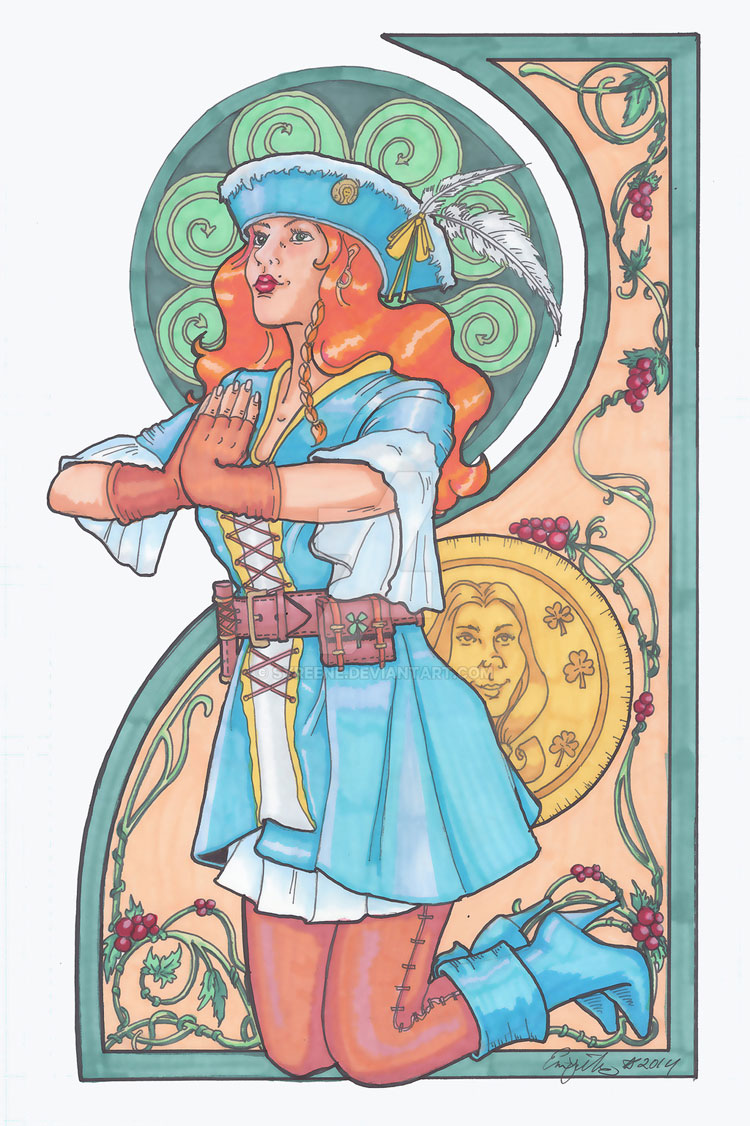Tymora
Tymora (tie-more-ah), the friendly, graceful, and kind deity of good fortune, owes her impressive popularity to two factors. Firstly, her dominance over narrow escapes and lucky discoveries makes her the patron of choice to Abios' burgeoning adventurer population, who propitiate her in hopes of prolonged survival and spectacular takes.
Clergy and Temples
Those commoners who fail to take themselves too seriously see the servants of Tymora as energetic advocates of fun and adventure. The clerics preach a doctrine that urges their followers to take chances and do something, rather than sitting around and daring nothing. Accordingly, those who choose Tymora as patron tend to possess a zest for life and a calm assurance that the Lady Who Smiles will ensure they live a long and fruitful life. Halflings consider Tymora to be one of Yondalla’s Children, and consider her widespread worship in human lands as simply the greatest of Lady Luck’s numerous humorous cons.
Clerics of Tymora, often called luck bringers, pray for their spells in the morning. The faithful typically greet each other by touching holy symbols, often embracing to do so. The clergy officially recognizes no set rituals, with religious observances varying wildly according to the dictates of each temple. Tymora’s clerics most commonly multiclass as bards or rogues, but they have been known to try almost any class combination.
Clerics of Tymora favor gaiety and spontaneity, believing that those who enjoy the greatest fortune are those who take the greatest risks. They position their temples as refueling stops for adventuring bands, often offering such staples as holy water and healing potions. Some churches take this a step further, offering excessive secret aid to the most daring of adventurers in a public relations effort to “prove” the value of Tymora’s doctrine. Clerics hail the miraculous success of these heroes upon their return from dangerous dungeons and haunted tombs, declaring their survival and plunder the reward of Lady Luck. When such groups are consumed by walls of living tentacles or walk into a sphere of annihilation set into the mouth of giant bas-relief demon faces, Tymoran clerics are notably silent.
Each Tymoran temple is an independent operation with its own hierarchy and doctrinal interpretation, which usually boils down to the whims of the high priest or priestess informed by a baseline collection of beliefs and customs.
Dogma
One should be bold, for to be bold is to live. A brave heart and a willingness to take risks beat out a carefully wrought plan nine times out of ten. Place yourself in the hands of fate and trust to your own luck. Bear and conduct yourselves as your own masters, showing your good or bad fortune as confidence in the Lady. Chase your own unique goals, and the Lady aids the chase. Without direction or goals, you soon know the embrace of Beshaba, for those on no set course are at the mercy of misfortune, which has no mercy at all.
History and Relationships
Prior to the Dawn Cataclysm, a single deity, Tyche, controlled both good and bad luck. A fickle deity whose attention just as often brought calamity as calm, Tyche wandered through her existence controlled only by her whims, seldom concerning herself with anything or anyone for more than a moment. As luck would have it, the amorous deity found herself embroiled in the war between deities initiated by Lathander, who attempted to restructure the Abian pantheon according to his own sense of propriety. Deciding quickly that her paramour had become altogether too serious, Tyche kissed the Morninglord with misfortune and left him to his fate.
During her travels, she came upon a beautiful rose, which she attempted to pluck from the earth. Curiously, the flower would not budge, so she cursed it with bad luck, whereupon its stem broke and it fell to the ground. Thinking little of the incident, she placed the rose in her hair and continued her roaming, oblivious to a dangerous corruption on her very person. The rose had been an aspect of Moander, deity of rot and decay. In short order, Moander worked its corruption into Tyche’s ear, eagerly draining the deity’s lifeforce and withering her form within. When she finally returned home, the oblivious Tyche came upon her friends Lathander and Selûne, as well as Azuth, who had been warned of Moander’s attack. Before the disgusting creature that had once been Tyche could greet her former companions, Selûne lashed out with a bolt of purifying light. Tyche’s form split right down the middle, and from the husk emerged a completely new deity.
A bright, somewhat smaller version of Tyche arose first, looking upon the three deities with a bemused expression of confused recognition, as if she had known these figures in dreams even if they had never met. Bold, beautiful Beshaba was second to arise.
After a brief battle in which the good and evil aspects of the fallen Tyche nearly destroyed each other if not for the combined effort of Azuth, Lathander, and Selûne, Beshaba cursed the four deities, decrying them as murderers and luckless villains unworthy of both her presence and her good will. Swearing to bedevil their followers with ill fortune for eternity, the Maid of Misfortune left the assembly in a torrent of acrid smoke and foul language. The newborn deity, Tymora, simply shrugged, a small frown her only display of emotion.
Since that day, Tymora and Beshaba have continued their struggle. For Beshaba, their battle is one of wholehearted destruction. Tymora, for her part, seeks to stave off the Maid of Misfortune’s depredations, occasionally punishing her cruel ambition with a particularly choice humiliation.
Though it would not be fair to call Tymora cruel, she does delight in practical jokes, often attempting to bring good humor to stern deities such as Helm and Tyr through the careful application of gentle teasing and playful trickery. Though she inherited all the good qualities of her progenitor, she also retains much of Tyche’s romantic fickleness--she’s seduced dozen of deities and countless mortals, seldom staying with a single paramour for more than a year or two.
Divine Classification
Intermediate Deity
Honorary & Occupational Titles
- Lady Luck
- The Lady Who Smiles
- Our Smiling Lady
Children
Gender
Female





